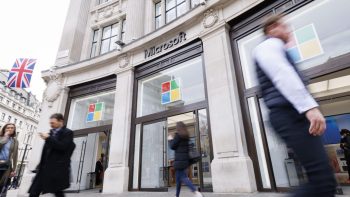Ruling is a bundle of trouble for Microsoft
TEXT OF STORY
KAI RYSSDAL: The European Union’s second highest court ruled today that the world’s dominant software company is neither micro, nor soft. Judges upheld a lower court’s decision that the maker of the ubiquitous Windows software is using its size and market share to keep competitors out of the market. The ruling includes a fine of more than $600 million. That’s not, in and of itself, a big deal for Microsoft. The company is sitting on tens of billions in cash. But court-ordered changes in the way Microsoft does business could be a problem. Our Washington bureau chief John Dimsdale reports.
JOHN DIMSDALE: To comply, Microsoft will have to reveal closely guarded Windows secrets to enable rival software to work more smoothly with its near-monopoly operating system. It will also have to continue selling a European version that does not contain Windows Media Player for video and audio.
And Joe Wilcox, who writes for the blog Microsoft Watch, says today’s decision opens up more potential challenges to Windows features like built-in search engines.
JOE WILCOX: So Google could come forth and complain about integrated search. Someone else could come and complain about Web browsers. And Microsoft could in the future find itself unbundling a heck of a lot more than just the media player.
But Microsoft, which is still deciding whether to appeal, has already changed its go-it-alone business tactics. Computer analyst Rob Enderle says in anticipation of the European Union’s hard line, Microsoft has been reaching out to former rivals.
ROB ENDERLE: So, Novell and Sun, who are on the other side of this, are now relatively closely partnered with Microsoft. Sun is actually now selling Microsoft Windows on their hardware.
Given the global market for computer software, Microsoft may have a tough time meeting European competition laws that are very different from those in the U.S., where the company settled an antitrust case with the Justice Department back in 2001. The dual standard worries Shawn Heather at the U.S. Chamber of Commerce.
SHAWN HEATHER: This kind of difference of opinion between U.S. and E.U. regulators allows multiple other regulators around the globe to potentially craft their own view of what constitutes a competitive marketplace.
The Justice Department today said it is concerned the European ruling will stifle competition and innovation in the software industry.
In Washington, I’m John Dimsdale for Marketplace.
There’s a lot happening in the world. Through it all, Marketplace is here for you.
You rely on Marketplace to break down the world’s events and tell you how it affects you in a fact-based, approachable way. We rely on your financial support to keep making that possible.
Your donation today powers the independent journalism that you rely on. For just $5/month, you can help sustain Marketplace so we can keep reporting on the things that matter to you.


















